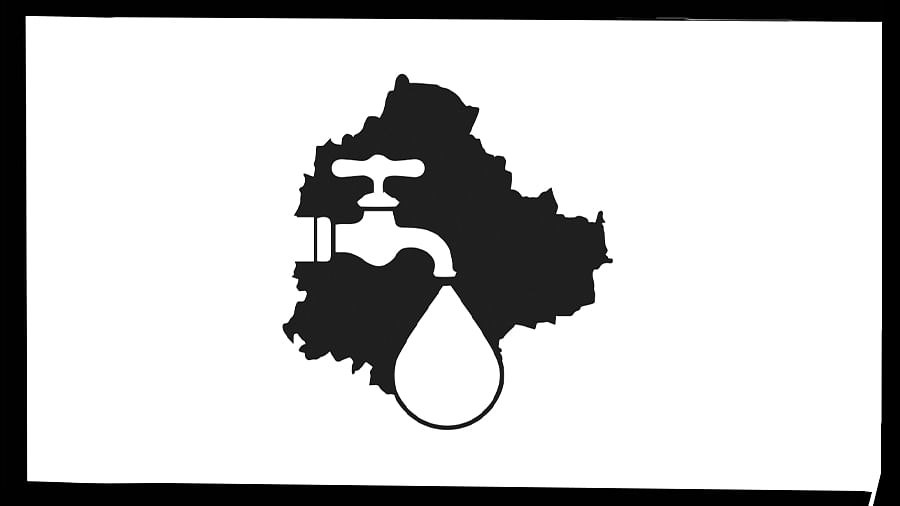
Borewells, borewells everywhere. Not a drop to drink.
With apologies to the English poet, Samuel Coleridge, who wrote the famous lines:
Water, water everywhere,
Nor a drop to drink.
Bengaluru may not be facing such a dreadful situation right now, but it is experiencing a water crisis, evident in drying borewells and shortages in the supply of BWSSB water.
Deputy Chief Minister D K Shivakumar has said that the borewell in his house, in an elitist locality, has also dried up. A few years ago, a study forecast that certain cities, including Bengaluru and Cape Town in South Africa, would run out of water.
Indeed, Cape Town was on the verge of such a crisis but overcame the danger through certain drastic measures. According to a 2018 Niti Aayog report, 40 per cent of the population would have no access to drinking water by 2030.
The problems relating to water supply as well as remedial measures have been articulated from time to time. What is missing, despite there being a State Policy for Water, is a coherent long-term policy for Bengaluru, analysing the issues and spelling out strategies to ensure adequate water supply throughout the year. Let me put forth seven sutras that call for urgent action.
Water Conservation: Karnataka is a water-stressed state and needs to conserve the available water resources. In reality, a lot of water is wasted in daily use, especially in washing and bathing. Even drinking water is wasted, more so water supplied in bottles in star hotels and events, where people consume a little and the rest goes down the drain. According to some experts, the rainwater received in Bengaluru (an annual average of 800 mm) should suffice to serve the water needs of the city if properly conserved through rainwater harvesting and recharging. Although water harvesting is mandatory, implementation is poor. The agricultural sector, where farmers with pump sets enjoy free water, also contributes to significant water wastage.
Regulating groundwater extraction: Overexploitation of groundwater is a major reason for water shortages. Strangely, the government encourages the digging of more borewells during the summer, as it is happening now. Niti Aayog has warned that 21 cities, including Begaluru, Chennai, Delhi, and Hyderabad, will run out of groundwater. Though there is a law regulating the use of groundwater, it is hardly enforced. The government has warned ‘tanker mafias’ not to exploit the situation and prescribed rates for the supply of water. How effective the enforcement will be is anybody’s guess. There are, however, examples of water rejuvenation in and around Devanahalli that can be adopted in other areas.
Reuse of waste water: About 60 per cent of the water is wasted, with only half being recycled. Bengaluru has a number of sewage or waste water treatment plants, and treated water is supplied for non-potable purposes such as washing, gardening (as in Cubbon Park and Lalbagh), etc. BWSSB, however, is not able to market it adequately due to low demand from industries. It may be time to consider the use of recycled water for drinking purposes, as is done in Singapore, where recycled and bottled water is sold as Newater. This would require tertiary treatment up to a level when it becomes fit for drinking and adopting the right technology. When I proposed this some years ago after a visit to Singapore and tasting Newater, the reaction was one of shock: "Ah, drinking sewage water!" With its own traditional concepts of purity, India may not be psychologically attuned to accept the idea.
Water for agriculture: While people in Bengaluru are primarily concerned about drinking water and other subsidiary uses, in the state as a whole, 80% of fresh water is used for agriculture. The problem is aggravated by the fact that excessive water is used for the cultivation of paddy and sugarcane in irrigated areas, which has an adverse impact on the availability and supply of water for other purposes. The solution lies in switching over from water-intensive crops to light-irrigated crops like pulses, millets, and horticultural crops. Efforts to persuade farmers to change their cropping patterns have been futile. However, there is no alternative to crop diversification, in the interests of efficient use of water as well as achieving agricultural prosperity.
Water cost-price-value gap: BWSSB, which procures water from the Cauvery River about 90 km away from the city, supplies water far below its production cost. There is a disconnect between cost, price, and the intrinsic value of water, leading to a tendency to waste. Water being a political hot potato, revision of rates is rare. Water boards across the country run at huge losses. But with increasing costs and population, there is a need for a rethinking on the subject, although subsidies cannot be totally avoided.
Set up a Water Regulatory Authority: Unlike in the power sector, where electricity regulatory commissions have been set up in all states in addition to the one at the Centre, there is no regulatory mechanism for the use of water. Owing to political compulsions, state governments will not be able to effect drastic reforms in the water sector. It is therefore imperative that a water regulatory authority be set up in the state to ensure certain standards for optimum use of water and the fixing of water rates.
Urban Planning: Finally, water must be viewed from a holistic perspective and treated as part of urban planning. Unending construction in Bengaluru adds to water consumption. Unless there is a policy to restrict construction, particularly illegal construction, the damage to the city will be irreparable, affecting the quality of life of citizens. If we don’t wake up to the alarming situation now and act, the day may not be far off when our capital city will have to face not just a water crisis but a water famine.
The Silicon Valley of India may well turn into a waterless valley, leading to mass migration.
(The writer is a former chief secretary, Government of Karnataka)